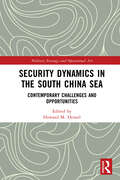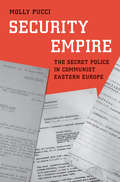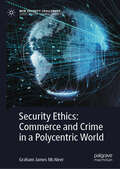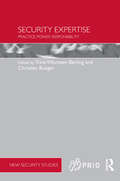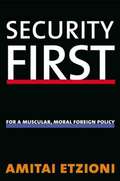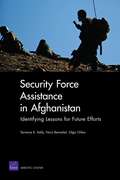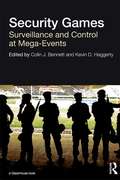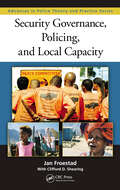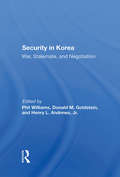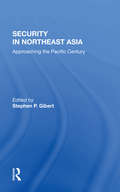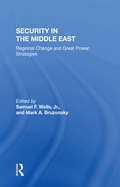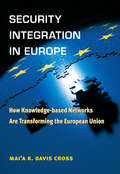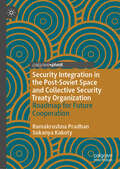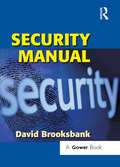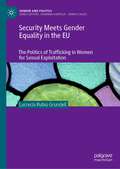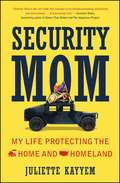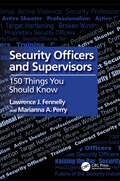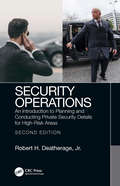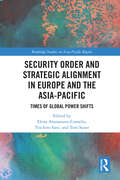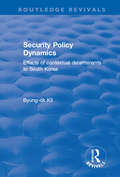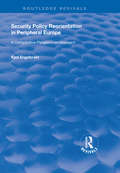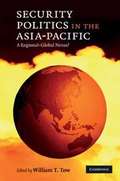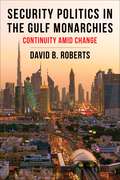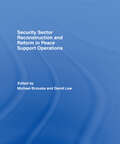- Table View
- List View
Security Dynamics in the South China Sea: Contemporary Challenges and Opportunities (Military Strategy and Operational Art)
by Howard M. HenselThis volume examines the South China Sea’s regional security dynamics, highlighting the challenges and opportunities for both littoral and non-littoral states.The South China Sea is a vital pathway for the great container ships and tankers, as well as for the naval vessels of today. Indeed, the security of the contemporary global economy is reliant more than ever upon the dependability of freedom of navigation through the waters of the South China Sea. This volume concentrates on the security of the South China Sea sub-region. It is designed to help illuminate the contemporary security dynamics within this important sub-region by highlighting its development, the contemporary challenges and opportunities confronting both the littoral states and the non-littoral powers that are active in the sub-region, and the policy responses of those states as they seek to defend and promote their national interests. This book is composed of 16 chapters and is organized into five thematic sections. Part I of the book is designed to set the historical context. Part II examines some of the contemporary challenges and opportunities that present themselves in the sub-region, while Part III focuses on Chinese policy in the South China Sea sub-region. Parts IV and Part V analyse and evaluate the contemporary policies of the various littoral and non-littoral powers that are active in the South China Sea sub-region. The collective analyses and assessments of the contemporary perceptions and policies of the various littoral and non-littoral powers active in the South China Sea in response to the traditional and non-traditional challenges within the sub-region that are examined in the chapters contained in Parts III, IV, and V, framed against the material presented in Parts I and II, provides the basis for observations concerning areas of conflicting and coinciding interests in the concluding chapter of the book.This book will be of interest to students of the South China Sea, maritime security, Asian politics, and international relations.
Security Empire: The Secret Police in Communist Eastern Europe (Yale-Hoover Series on Authoritarian Regimes)
by Molly PucciA compelling examination of the establishment of the secret police in Communist Poland, Czechoslovakia, and Eastern Germany †‹This book examines the history of early secret police forces in Poland, Czechoslovakia, and East Germany in the aftermath of the Second World War. Molly Pucci delves into the ways their origins diverged from the original Soviet model based on differing interpretations of communism and local histories. She also illuminates the difference between veteran agents who fought in foreign wars and younger, more radical agents who combatted “enemies of communism” in the Stalinist terror in Eastern Europe.
Security Ethics: Commerce and Crime in a Polycentric World (New Security Challenges)
by Graham James McAleerThis book explores criminal threat to commercial security and the problem of the ethical control of political and criminal risk alongside and in the absence of government. Theoretically, it links ethics to geopolitics and political economy. Security Ethics: Commerce and Crime in a Polycentric World builds from well-known thinkers, but not theorists typically found in books of applied ethics and security studies. Chapters include Francisco de Vitoria&’s account of just war applied to pirates; John Locke on dignity and the illegal trade in body parts; David Hume on community justice combatting cartels; Adam Smith on luxury and knockoffs; Bakunin and anarchist gunrunning; Johan Huizinga on play and crime; David Ross on corporate obligation in the face of partizan risk to hotel security; Carl Schmitt on geography and smuggling; Aurel Kolnai on privilege and corporate secrets; and David Petraeus, author of The US Army/Marine Corps Counterinsurgency Field Manual, respecting ecotage and commercial legitimacy.
Security Expertise: Practice, Power, Responsibility (PRIO New Security Studies)
by Christian Bueger Trine Villumsen BerlingThis volume brings together scholars from different fields to explore the power, consequences and everyday practices of security expertise. Expertise mediates between different forms of knowledge: scientific and technological, legal, economic and political knowledge. This book offers the first systematic study of security expertise and opens up a productive dialogue between science and technology studies and security studies to investigate the character and consequences of this expertise. In security theory, the study of expertise is crucial to understanding whose knowledge informs security making and to reflect on the impact and responsibility of security analysis. In science and technology studies, the study of security politics adds a challenging new case to the agenda of research on expertise and policy. The contributors investigate cases such as academic security studies, security think tanks, the collaboration between science, anthropology and the military, transnational terrorism, and the ethical consequences of security expertise. Together they challenge our understanding of how expertise works and what consequences it has for security politics and international relations. This book will be of particular interest to students of critical security studies, sociology, science and technology studies, and IR/security studies in general.
Security First: For a Muscular, Moral Foreign Policy
by Amitai Etzioni"Rarely have more profound changes in American foreign policy been called for than today," begins Amitai Etzioni in the preface to this book. Yet Etzioni's concern is not to lay blame for past mistakes but to address the future: What can now be done to improve U. S. relations with the rest of the world? What should American policies be toward recently liberated countries such as Iraq and Afghanistan, or rogue states like North Korea and Iran? When should the United States undertake humanitarian intervention abroad? What must be done to protect America from nuclear terrorism? The author asserts that providing basic security must be the first priority in all foreign policy considerations, even ahead of efforts to democratize. He sets out essential guidelines for a foreign policy that makes sense in the real world, builds on moral principles, and creates the possibility of establishing positive relationships with Muslim nations and all others. Etzioni has considered the issues deeply and for many years. His conclusions fall into no neat categories--neither "liberal" nor "conservative"--for he is guided not by ideology but by empirical evidence and moral deliberation. His proposal rings with the sound of reason, and this important book belongs on the reading list of every concerned leader, policy maker, and voter in America.
Security Force Assistance in Afghanistan: Identifying Lessons for Future Efforts
by Nora Bensahel Olga Oliker Terrence K. KellySecurity force assistance (SFA) is a central pillar of the counterinsurgency campaign being waged by U.S. and coalition forces in Afghanistan. This monograph analyzes SFA efforts in Afghanistan over time, documents U.S. and international approaches to building the Afghan force from 2001 to 2009, and provides observations and recommendations that emerged from extensive fieldwork in Afghanistan in 2009 and their implications for the U.S. Army.
Security Games: Surveillance and Control at Mega-Events
by Kevin D. Haggerty Colin J. BennettSecurity Games: Surveillance and Control at Mega-Events addresses the impact of mega-events – such as the Olympic Games and the World Cup – on wider practices of security and surveillance. "Mega-Events" pose peculiar and extensive security challenges. The overwhelming imperative is that "nothing should go wrong." There are, however, an almost infinite number of things that can "go wrong"; producing the perceived need for pre-emptive risk assessments, and an expanding range of security measures, including extensive forms and levels of surveillance. These measures are delivered by a "security/industrial complex" consisting of powerful transnational corporate, governmental and military actors, eager to showcase the latest technologies and prove that they can deliver "spectacular levels of security". Mega-events have thus become occasions for experiments in monitoring people and places. And, as such, they have become important moments in the development and dispersal of surveillance, as the infrastructure established for mega-events are often marketed as security solutions for the more routine monitoring of people and place. Mega-events, then, now serve as focal points for the proliferation of security and surveillance. They are microcosms of larger trends and processes, through which – as the contributors to this volume demonstrate – we can observe the complex ways that security and surveillance are now implicated in unique confluences of technology, institutional motivations, and public-private security arrangements. As the exceptional conditions of the mega-event become the norm, Security Games: Surveillance and Control at Mega-Events therefore provides the glimpse of a possible future that is more intensively and extensively monitored.
Security Governance, Policing, and Local Capacity (Advances in Police Theory and Practice)
by Clifford Shearing Jan FroestadThe security governance of South Africa has faced immense challenges amid post-apartheid constitutional and political transformations. In many cases, policing and governmental organizations have failed to provide security and other services to the poorest inhabitants. Security Governance, Policing, and Local Capacity explores an experiment that too
Security In Korea: War, Stalemate, And Negotiation (Ridgway Series In International Security Studies)
by Phil Williams Donald M GoldsteinAn erratic, aging North Korean leadership intent on dynastic succession and development of nuclear weapons is attracting a lot of attention in the Asia-Pacific Region -- an area of utmost importance to the United States. Current concerns about security in Korea provide the backdrop to this volume, which offers an overview of the evolution of security on the Korean peninsula and an assessment of the U.S. role there from the 1940s to the present. A distinctive feature of this volume is the long historical perspective that is brought to bear on contemporary security dilemmas. The renowned contributors examine U.S. policy prior to and during the Korean War and look at the subsequent changes in U.S. commitment to South Korea during a period of global stalemate that had been shaped in part by the war itself. The authors then assess the future of U.S.-Korean relations within the context of the changing international environment, considering the prospects for future strife, the merits of a cooperative security system, and the possibility of reunification.
Security In Northeast Asia: Approaching The Pacific Century
by Stephen P GibertThis book presents to the reader a comprehensive and integrated discussion of the Northeast Asian-Western Pacific region and its relationships to United States and world security concerns and international political stability.
Security In The Middle East: Regional Change And Great Power Strategies
by Shaun Murphy Mark Bruzonsky Samuel F. WellsThis book examines the deep-seated problems in the Middle East and their impact on the United States and its allies. Exploring the disruptive effects of the double-edged sword of nationalism and modernization, the contributors discuss the full range of Western security interests in the region. Case studies of key countries emphasize the prospect for peaceful political, economic, and cultural change. The authors analyze the ramifications of the Arab-Israeli conflict and the threats posed by Soviet penetration. Arguing that confusion and contradiction mark U.S. policy in the Middle East, the book concludes that U.S. strategists should focus not on curing the region's internal problems but on coping with them without sacrificing long-term goals for quick fixes.
Security Integration in Europe: How Knowledge-Based Networks are Transforming the European Union
by Mai'A K. Davis CrossAt a time when many observers question the EU's ability to achieve integration of any significance, and indeed Europeans themselves appear disillusioned, Mai'a K. Davis Cross argues that the EU has made remarkable advances in security integration, in both its external and internal dimensions. Moreover, internal security integration--such as dealing with terrorism, immigration, cross-border crime, and drug and human trafficking--has made even greater progress with dismantling certain barriers that previously stood at the core of traditional state sovereignty. Such unprecedented collaboration has become possible thanks to knowledge-based transnational networks, or "epistemic communities," of ambassadors, military generals, scientists, and other experts who supersede national governments in the diplomacy of security decision making and are making headway at remarkable speed by virtue of their shared expertise, common culture, professional norms, and frequent meetings. Cross brings together nearly 80 personal interviews and a host of recent government documents over the course of five separate case studies to provide a microsociological account of how governance really works in today's EU and what future role it is likely to play in the international environment. "This is an ambitious work which deals not only with European security and defense but also has much to say about the policy-making process of the EU in general." -Ezra Suleiman, Princeton University.
Security Integration in the Post-Soviet Space and Collective Security Treaty Organization: Roadmap for Future Cooperation
by Ramakrushna Pradhan Sukanya KakotyThis book explores the role of the Central Security Council (CSTO) in ensuring regional security, analyzing the evolution of cooperation between post-Soviet states since the Soviet Union's demise. It focuses on the establishment of the CSTO as a regional organization since 2002, with six out of 11 CIS members. The book fills a gap in existing research on the security paradigm in post-Soviet space and the collective security mechanism of CSTO. Many western scholars have not understood the importance of multilateralism and Russia's foreign policy in maintaining security measures in the post-Soviet space. The book is an informative handbook on regional integration, Eurasianism, and CSTO for students, scholars, readers, academicians, and researchers working on this area.
Security Manual
by David BrooksbankSecurity Manual provides practical guidance on all aspects of security work and is a ready made source of information for all members of the security profession, including managers, supervisors and trainers. This eighth edition has been fully restructured to better reflect recent changes in the criminal law, fire protection and security practices. New chapters on powers of arrest, industrial disputes, conflict resolution, dealing with emergencies, cultural awareness and door supervising have been added, including the latest information and procedures that should be adopted in relation to an act of terrorism. The manual continues to pay attention to the law of theft, other criminal offences affecting security and the basics of security practice, and can rightly be regarded as the standard overall work on the subject and a practical reference for existing security practitioners and those who are aspiring to enter the security profession. Security Manual is also ideal for those seeking professional qualifications such as: NVQ Levels 1, 2 and 3 in Security Guarding and for Supervisors; NVQ Level 3 in Investigations; C&G, BIIAB and NCFE qualifications in Door Supervision. Security Manual is the essential guide to this subject, and has been described as 'standard issue for every security officer, along with the uniform'.
Security Meets Gender Equality in the EU: The Politics of Trafficking in Women for Sexual Exploitation (Gender and Politics)
by Lucrecia Rubio GrundellThis book explores the triangular dynamics of securitisation and desecuritisation that underpin the EU’s approach to trafficking in women for sexual exploitation. That is, the progressive securitisation of trafficking in women for sexual exploitation within the EU’s anti-trafficking policies and the existence of two distinct and competing approaches that coexist among feminist struggles against such trend and that largely follow the two opposing views that structure feminist debates on prostitution: a neo-abolitionist approach, on the one hand, that is increasingly defended from within EU institutions, and has therefore become increasingly entangled with the securitisation of trafficking in women; and a sex work approach, on the other hand, that has been largely relegated to the domains of academia and civil society. As such, this book addresses the intersection of security and feminist neo-abolitionism within the EU’s anti-trafficking policies, as well as the de-securitising potential of the anti-trafficking advocacy of both neo-abolitionist and sex worker organisations operating at EU level. This book is unique in that it unprecedentedly brings together three bodies of literature that rarely interact: Critical Security Studies, EU Gender Studies and the feminist literature on prostitution and trafficking in women and demonstrates their fruitful interaction in an extensive empirical analysis of the EU’s internal security, violence against women and anti-trafficking policies.
Security Mom: An Unclassified Guide to Protecting Our Homeland and Your Home
by Juliette KayyemIt's time to put the "home" back into our homeland. Part prescription and part memoir, this exceptional view of America's security concerns by a leading government Homeland Security advisor, Pulitzer Prize-finalist columnist, CNN analyst and mother of three delivers a message and a plan: security begins at home."Soccer Moms" are so last decade. Juliette Kayyem is a "Security Mom." A national security expert who worked at the highest levels of government, and also a mom of three, she's lived it all--from the fears of being a target of an anthrax hoax, to the challenges of managing the BP Oil spill, to the more intimate challenges of defeating lice in her children's hair--and now she tells it all. Weaving her personal story of marriage and motherhood into a fast-paced account of managing the nation's most compelling disasters, Juliette recounts the milestones that mark the path of her unpredictable, daring, funny, and ultimately relatable life. In her insider's look at American emergency and disaster management, Juliette distills years of professional experience into smart, manageable guidelines for keeping your family safe in an unpredictable world. From stocking up on coloring books to stashing duplicate copies of valuable papers out of state, Juliette's wisdom does more than just prepare us to survive in an age of mayhem--it empowers us to thrive. Her message, the result of years working where tragedy has thrived, is ultimately positive: starting in our homes, each of us--every mom, dad, aunt, uncle, yes every citizen--has the capacity to build a more resilient nation. Security Mom is an utterly modern tale about the highs and lows of having-it-all parenthood and a candid, sometimes shocking, behind-the-scenes look inside the high-stakes world of national security. Unlike so many in her field who seem invested on terrifying citizens into paralysis, Juliette's motto has always been "don't scare, prepare!" In her signature refreshing style, Juliette reveals how she came to learn that homeland security is not simply about tragedy and terror; it is about what we can do every day to keep each other strong and safe.
Security Officers and Supervisors: 150 Things You Should Know
by Lawrence J. Fennelly Marianna A. PerrySecurity Officers and Supervisors: 150 Things You Should Know presents an array of relevant topics, including addressing “Tips of the Trade” in how to manage a team of professionals and serve as an effective supervisor. This includes both keeping management informed of decisions, aligning policy, procedure, and training with business objectives, and hiring and managing a team of professionals to maintain continuity of operations and a safe, secure environment. There are many factors involved in managing a department and workforce and the book uses a handy-reference format to present the salient information, both concrete knowledge as well as the softer skills, required for managers to motivate individuals and lead teams to pull in the same direction.Short, easy-to-read chapters include lists of relevant definitions, some do’s and don’ts, best practices, emerging trends, and well as example case studies based upon the authors’ professional experience. The primary goal is to provide a foundation for readers to identify, comprehend, and apply management concepts and security principles in their own environments so that readers will be readily prepared to troubleshoot problems and overcome challenges.Building and leading a trusted team that can set and achieve clearly outlined objectives begins with leadership. Security Officers and Supervisors: 150 Things You Should Know outlines those principles and traits required for professionals to succeed when promoted (though, more often than not, thrust!) into a security supervisory role.
Security Operations: An Introduction to Planning and Conducting Private Security Details for High-Risk Areas
by Robert H. Deatherage, Jr.Security Operations: An Introduction to Planning and Conducting Private Security Details for High-Risk Areas, Second Edition was written for one primary purpose: to keep people alive by introducing them to private security detail tactics and techniques. The book provides an understanding of the basic concepts and rules that need to be followed in protective services, including what comprises good security practice. This second edition is fully updated to include new case scenarios, threat vectors, and new ambush ploys and attack tactics used by opportunistic predators and seasoned threat actors with ever-advanced, sophisticated schemes. Security has always been a necessity for conducting business operations in both low- and high-risk situations, regardless of the threat level in the operating environment. Overseas, those with new ideas or businesses can frequently be targets for both political and criminal threat agents intent on doing harm. Even in the United States, people become targets because of positions held, publicity, politics, economics, or other issues that cause unwanted attention to a person, their family, or business operations. Security Operations, Second Edition provides an introduction to what duties a security detail should perform and how to effectively carry out those duties. The book can be used by a person traveling with a single bodyguard or someone being moved by a full security detail. FEATURES • Identifies what can pose a threat, how to recognize threats, and where threats are most likely to be encountered • Presents individuals and companies with the security and preparedness tools to protect themselves when operating in various environments, especially in high-risk regions • Provides an understanding of operational security when in transit: to vary route selection and keep destinations and movement plans out of the public view • Outlines the tools and techniques needed for people to become security conscious and situationally aware for their own safety and the safety of those close to them An equal help to those just entering the protection business or people and companies that are considering hiring a security detail, Security Operations is a thorough, detailed, and responsible approach to this serious and often high-risk field. Robert H. Deatherage Jr. is a veteran Special Forces Soldier and private security consultant with thirty years’ experience in military and private security operations. His various writings on security topics cover security operations, threat assessment, risk management, client relations, surveillance detection, counter surveillance operations, foot and vehicle movements, and building security—blending solid operational theory with practical field experience.
Security Order and Strategic Alignment in Europe and the Asia-Pacific: Times of Global Power Shifts (Routledge Studies on the Asia-Pacific Region)
by Yoichiro Sato Tom Sauer Elena Atanassova-CornelisElena Atanassova-Cornelis, Yoichiro Sato, Tom Sauer, and their contributors examine the implications of the shifts in power for the regional security order, as the longterm relative decline of the US standing in the global hierarchy of power is more pronounced than ever due to the challenges it faces from the rising China in Asia and the reviving Russia in Europe.The world is in disarray, and the balance of power is shifting, which results in enhanced tensions and wars, including on the territory of Europe. The complexity of the international order that prevails today possibly misleads us toward viewing everything in terms of a bipolar competition, as predicted by systemic-level realism. While membership of the multilateral NATO Alliance expands in Europe in light of the ongoing Russian invasion of Ukraine, China’s assertive behavior in Asia has produced numerous strategic alignments that are short of a formal alliance involving Asian states, the US, and European countries. ‘Hedging’ strategies are commonly found in Asian states’ approaches to security, working against the bifurcation of powers. Contrarily, European entries into alignments in the ‘Indo-Pacific’ have demonstrated the inseparability of security in Asia from security in Europe through the shared thread of ‘engaging the US’. Whether China defines its challenge against the US in regional or global terms also has differing implications for the evolution of the international system. This book, with contributions by Asian, European, and North American experts, provides an overview of the two regions’ differing alignment paths in comparative and inter-regional perspectives.The book is a valuable resource for academics, researchers, practitioners, and policy analysts interested in European and Asia-Pacific security, as well as international and regional security issues.
Security Policy Dynamics: Effects of Contextual Determinants to South Korea (Routledge Revivals)
by Byung-ok KilThis title was first published in 2001: Byung-ok Kil's thorough analysis deals with both the broad area of public policy and the specific topic of national security policy change in Korea. Using an historical comparative approach, he tests the relative importance of international and domestic developments as determinants of security policy change. Drawing extensively on carefully selected sources of quantitative and qualitative data including original documents and interviews, this engaging text is of theoretical, methodological and applied policy relevance to the academic community and of substantive interest to a broader audience of governmental officials in national security and related policy areas.
Security Policy Reorientation in Peripheral Europe: A Comparative-Perspectivist Approach
by Kjell EngelbrektThis title was first published in 2002. This rich comparative analysis looks at security policy reorientation in four European states located at the periphery of the European continent. During the post-Cold War period, Greece, Bulgaria, Sweden and Finland conducted a security policy that was heavily influenced by their close proximity to the iron curtain . Probing this transition during a decisive phase of the post-Cold War reconstitution of the wider European security order, the author analyzes national security policy making from the standpoints of three international relations traditions - realism, institutionalism and political anthropology. This engaging work is invaluable for students, scholars and policy analysts working in the field of international relations and European politics.
Security Politics in the Asia-Pacific: A Regional-Global Nexus?
by William T. TowAsia is experiencing major changes in its security relations. This book brings together respected experts to assess both the theoretical and empirical dimensions of the Asian security debate. Building on the latest research on Asia's regional security politics, it focuses on the 'regional-global nexus' as a way to understand the dynamics of Asian security politics and its intersection with global security. Contributors to the volume offer diverse but complementary perspectives on which issues and factors are most important in explaining how security politics in Asia can be interpreted at both the regional and global levels of analysis. Issues addressed include power balancing and alliances, governance and democracy, maritime and energy security, the relationship between economics and security, 'human security', terrorism, nuclear non-proliferation, climate change and pandemics. This work will serve as a standard reference on the evolution of key issues in Asian security.
Security Politics in the Gulf Monarchies: Continuity Amid Change (Columbia Studies in Middle East Politics)
by David B. RobertsThe Gulf monarchies—Saudi Arabia, Kuwait, Bahrain, Qatar, Oman, and the United Arab Emirates—play crucial roles in world markets and politics. Their economies, which have traditionally been driven by oil revenues, have simultaneously propelled transformative change and preserved the traditional order. Fossil fuel wealth has underwritten an implicit social contract characterized by generous welfare states, ruler-centric politics, and a heavy state presence in the economy, facilitating stability during tumultuous times. However, as the transition toward renewable energy looms, will the Gulf monarchies be able to adapt?David B. Roberts offers a definitive guide to continuity and change in the Gulf region. He explores the forces challenging and bolstering the status quo across the political, social, economic, military, and environmental dimensions of security. Roberts examines the six monarchies individually and holistically, considering their recent histories and contemporary concerns. Beneath wide-ranging changes affecting these countries, he pinpoints key dynamics and structures that have persisted over the long term. The book examines key topics such as generational change in leadership, migrant workers, female labor force participation, U.S. military influence, and the multifaceted threat of climate change. Roberts scrutinizes how a move away from the oil-centered economic model could reverberate across the social spectrum, with profound implications for security. Suitable for a range of courses and offering important new insights for experts, this book is an accessible and up-to-date overview of the politics of a key world region.
Security Relations between China and the European Union
by Kirchner Emil J. Thomas Christiansen Han DorussenOver the past decade, the EU and China have expanded their relations beyond a focus on economic and trade issues to the sphere of security. Taking a broad definition of security, a multidisciplinary approach, and a comparative perspective (including scholars from both Europe and China), this book provides an in-depth analysis of the extent to which the EU and China not only express similar threat concerns, or make declarations about joint responses, but also adopt concrete measures in the pursuance of security cooperation. In particular, the book seeks to explore a range of key themes in the field of EU-China security cooperation such as nuclear proliferation, international terrorist threats and cyber attacks. Besides providing an overview of the areas where security cooperation exists and where it does not, it also highlights the aspects of convergence and divergence and the reasons for their occurrence.
Security Sector Reconstruction and Reform in Peace Support Operations
by Michael Brzoska and David LawThis volume provides a framework for analyzing security sector reform under international tutelage.Following violent conflict and military interventions, international organizations or coalitions of countries increasingly engage in post-conflict reconstruction. Part of the international post-conflict agenda is thereconstruction orreform of th
